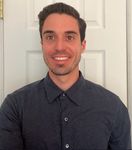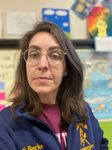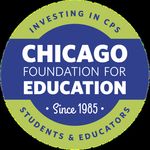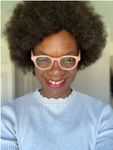2022 ARLI Policy Forum - Chicago Foundation for Education
←
→
Page content transcription
If your browser does not render page correctly, please read the page content below
2022 ARLI Policy Forum
Thursday, June 9
5:00pm to 7:30pm
Zoom Registration Required
KATIE SAESAN
Polaris Charter Academy
Leveraging Text-Based Discussions to Achieve ELA Engagement
Katie Saesan is a 5th and 6th grade English Language Arts (ELA) teacher at Polaris
Charter Academy in the West Humboldt Park neighborhood of Chicago. She earned
her bachelor’s in English with a Language Arts concentration from the University of
Wisconsin-Parkside, and her master’s in Curriculum and Instruction: Reading
Interventionist from Concordia University Nebraska. In her nine years of classroom
teaching, her love and passion has continued to focus on finding ways to
meaningfully engage students in reading and writing while developing life-long
readers.
This research investigated the question: How do text-based discussions contribute to
middle school students' engagement in the ELA classroom? After two years of
disrupted learning due to the pandemic, engaging students is as critical as ever.
Polaris Academy has a strong culture that encourages discussion in math, science,
and social studies, beginning in the primary grades, as a focal learning mode for
students. In an effort to maximize what was already a strength of many students,
this research sought to examine the impact of the strategic usage of text-based
discussions on students' motivational and behavioral engagement in the ELA
classroom. You can contact Katie at ksaesan@pcachicago.org to learn more about
her research.
DIONNE VICTORIA MILTON
Art In Motion
Uncovering the Connections between Art and Science
Dionne Victoria Milton is an educator and award-winning Chicago artist. Dionne has
exhibited in the United States Congress Library, as well as in Chicago’s Museum of
Science and Industry. She has taught all over Chicagoland, in states other than
Illinois, and in South Korea where she taught English using art as a modality. She has
a Master’s in Teaching from the University of Chicago, and is currently a science
teacher at the Art in Motion school in Chicago. Dionne currently occupies the roles of
vice-president, treasurer, and co-founder of The Healing Academy in Bridgeport.
Have you ever noticed the similarities between art and science? If not, that's ok.
Most people don't see the ways in which they intersect, so you may likely not have
noticed how the very act of art-making is similar to conducting a science experiment.
Through a series of questions, experiments, and art-making experiences, any concept
can be learned. This research explores how art can help make science more
accessible and enjoyable for students who are not historically drawn to science. You
can contact Dionne at thedionnevictoria@gmail.com to learn more about her
research.2022 ARLI Policy Forum
Thursday, June 9
5:00pm to 7:30pm
Zoom Registration Required
MELISSA HAUSSER
National Teachers Academy (NTA)
There Are Black People in the Future
Melissa Hausser is an 8th grade Diverse Learner teacher at National Teachers
Academy (NTA), a public elementary school in Chicago’s South Loop neighborhood.
She is proud to have been part of the NTA community for 11 years! Melissa attended
Purdue University for her undergraduate degree and received her Master’s in
Education from National Louis University. Her interests include spending time with her
cat Todd, playing board games, reading a good book, and going to any live event -
including but not limited to! - spoken word, musicals, plays, stand-up, concerts,
sporting events.
Melissa’s research is based on the belief that schools and classrooms should be loving
and joyful places for BIPOC children. Culturally relevant teaching requires teachers to
examine curriculum, policies, and practices to ensure that every single child is loved
and represented. Through Melissa’s research of Black Joy in education, the idea of
Afrofuturism and a diverse literary presence to increase Black Joy was uncovered. This
approach is important to her work as a middle school educator of Black students,
specifically regarding the texts they are exposed to during the school year. You can
contact Melissa at mahausser@cps.edu to learn more about her research.
MIRIAM GONZALEZ
Federico Garcia Lorca Elementary School
Using the Open Approach to Address Math Mindsets
Miriam Gonzalez, a native Chicago resident, began her teaching career 16 years ago.
She is currently a 3rd and 4th grade math and science teacher at Federico Garcia Lorca
Elementary School in the Avondale Park community. She received her bachelor’s in
Elementary Education, as well as a Middle School endorsement in Language Arts,
Social Science, and Science, from Northeastern Illinois University. Additionally, she
earned her Master’s in Curriculum and Instruction with an ESL endorsement and
Bilingual approval from Concordia University Chicago.
Miriam’s research focuses on her desire to address and improve math mindsets for
herself and her students; she believes this will help others to be confident not only in
math, but also in everyday situations. This research involved implementing the open-
approach method to math instruction as a way of introducing other strategies that
teachers can use to engage their students in all forms of learning. Miriam also found
that this research experience improved her overall personal mindset regarding math, as
well as her math teaching practices. You can contact Miriam at mgonzalez19@cps.edu
to learn more about her research.2022 ARLI Policy Forum
Wednesday, June 15
5:00pm to 7:30pm
Zoom Registration Required
ANDY DeVIVO
AUSL - Tarkington School of Excellence
Self-Paced, Blended Instruction in the 4th Grade Math Classroom
Andy DeVivo teaches 4th grade bilingual math and science at Tarkington School
of Excellence in the Chicago Lawn neighborhood. Last year, Andy was a member of
the ARLI Program as a first-year Fellow, and researched what happens to student
engagement in science and engineering practices when social-emotional needs are
supported. Now in his sixth year of teaching, he is dedicated to creating a
classroom that balances the social-emotional needs of students with their
academic outcomes in math and science.
Andy’s research explored what happens for students when they learn math using a
blended, self-paced instructional model. With this model, students learn by
watching teacher-created instructional videos, and then move from lesson to
lesson only when they show mastery of the previous lesson. This allows each
student to learn and move at their own pace. Findings indicated that students were
able to successfully learn 4th grade math standards in a cooperative learning
environment with the support of instructors and peers. You can contact Andy at
atdevivo@cps.edu to learn more about his research.
NIAMH BURKE
Sawyer Elementary
Equity of Voice in a Post-Covid Classroom
Niamh Burke is a partially-deaf Irish immigrant and a passionate educator currently
teaching at Sawyer Elementary in the southside Gage Park community. She believes
that learning is a transformative experience, and seeks to serve her community by
empowering young people to think critically about the world in which they live.
In this research project, Niamh studied her 8th grade social studies classrooms with
the goal of building equity of voice. By intentionally incorporating several structured
and routine discussion protocols - while measuring student attitudes toward different
forms of discussion - she considered how to best foster students’ speaking and
listening skills in a post-covid reality. The project also allowed Niamh to meaningfully
wrestle with what is meant by the term “Equity of Voice”. You can contact Niamh at
nburke@cps.edu to learn more about her research.2022 ARLI Policy Forum
Wednesday, June 15
5:00pm to 7:30pm
Zoom Registration Required
AOKO OMWONY-HOPE
Doolittle Elementary
Here I Am! Cultivating Culture through Art
Aoko Omwony-Hope, born and raised in Kenya, now teaches K-8 visual art and
serves as the Arts Liaison at Doolittle Elementary in Bronzeville. An educator with 23
years of experience in CPS and private schools, she has served as teacher leader,
instructional coach, and resident principal. She earned a BFA in Textile Design from
Parsons New York and an MFA in Fiber Arts from the SAIC. She also holds a
certification in biological sciences from National Louis University and an MA in
School Leadership from Northeastern Illinois.
This project examined what happened when an appreciation for culture through
choice-based arts learning with 6th graders was purposefully cultivated. Using
student comments as starting points, Aoko developed culturally responsive art
learning experiences that beckoned students to tune into their emotions, identities,
and preferences. Student choices about art processes, mediums, and style of creation
became a conduit to their self-discovery and curiosity. Aoko found that her
responsiveness to students’ choices strengthened her relationships with them,
ultimately altering her view of what students value, what resonates with them, and
what gets them excited about art class. You can contact Aoko at aohope@cps.edu to
learn more about her research.
NATE RAMIN
Ellen Mitchell Elementary
Democratizing the Democratic Classroom: Civics & Socratic Seminar
Nate Ramin is a social studies teacher at Mitchell Elementary in West Town, where his
courses include the History of U.S. Activism, Global Issues, and Civics. He is a National
Board Certified Teacher, holds a Master’s of Education from DePaul, and has
undergraduate degrees in philosophy and classical studies from Loyola University -
Chicago. He was a 2018 Fulbright Fellow, traveling to Aotearoa, New Zealand to study
how community organizations can support student learning through place-based and
culturally-sustaining practices. Nate also spends time researching community-engaged
teaching practices and the impact student voice has on schools.
This project explored what happens when an 8th grade civics class is restructured
around the Socratic Seminar. With a Socratic Seminar, students engage in a formal,
text-based discussion wherein a student facilitator asks open-ended questions to the
rest of the class. While traditional teaching methods lean towards teacher-centered
approaches, Socratic Seminar attempts to place students directly within the inquiry and
learning processes. This learning format often increases student participation and
academic ownership, while simultaneously highlighting further areas for improvement.
You can contact Nate at naramin@cps.edu to learn more about his research.You can also read


























































